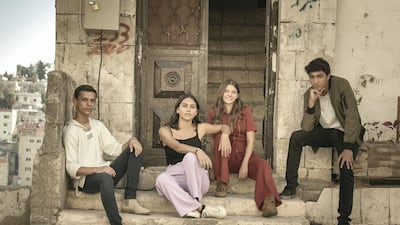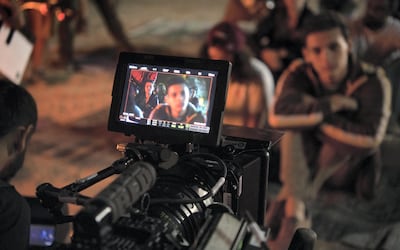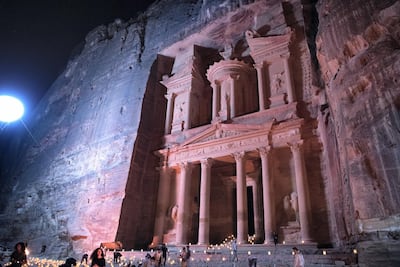On the wall of the hotel room in Amman, where I am meeting the cast of Jinn, is an enormous television. The screen shows a mocked-up Netflix home page, on which the faces of some of the actors in the streaming giant's first-ever Arabic-language original show hover above the "Play" button. Every now and then, 18-year-old actress Salma Malhas cocks her head to the right, in order to catch a glimpse of herself on the screen. Not in a self-satisfied way, but almost as if she needs to check one last time that this is really happening.
How it all began
It is easy to understand her disbelief, as just 12 months ago, Malhas, who is Palestinian but was raised in Jordan, was at school in Amman, studying for her end-of-year exams. Now she plays one of the lead characters in the show every TV-lover in the Arab world is talking about right now. “I don’t know if I’m ready for everything,” she says. “It’s going to be hectic, but I’m excited. It’s a new phase in my life.”
Malhas will need to adjust quickly. Jinn, a smart, supernatural thriller that switches between Amman's chaotic streets and the ancient ruins of Petra, is going to be massive. Malhas plays Mira, a teenager who accidentally summons a spirit – or jinn – from a cave during a school trip to Jordan's most famous archaeological site. When one of Mira's classmates falls to his death soon after, the students realise she has unleashed something evil. Something that threatens to pick each of them off, one by one.
Brothers Elan and Rajeev Dassani wrote Jinn. It is a classic high-school fright-fest, packed with jump-scares and teenage angst. We've seen this stuff plenty of times before, of course, from Stephen King's Carrie to Buffy the Vampire Slayer and Stranger Things, but none of these shows were in Arabic or set in the Middle East, which is why this launch is so important. The five-part series portrays teenagers from the Arab world in a way we don't often see, and the characters are not framed by politics or conflict, but by friendships, relationships, insecurities, music and great clothes. So, normal teenage stuff, basically.
"I wanted to make a show that represents teenagers from the region," says director Mir-Jean Bou Chaaya. "Not something with stereotypes or false representations written all over it […] Jinn is a great opportunity for everyone to see that we can make these shows, that we are allowed – or can allow ourselves – to imagine stories the way we want to imagine them."
This is particularly profound for Malhas, who grew up crying out for characters on screen she could recognise and empathise with. “It was so uncommon,” she says. “I would never see someone who lived a lifestyle like me.” She is proud to be part of a project that changes this. “I know that if I saw someone on screen that lived like I do and did the things I do on a daily basis, I would have been ecstatic. Most of the time, it was a story about forbidden love and the father trying to force his daughter to marry someone.”
At this point, Hamzeh Okab, 17, who plays Keras, a spirit from the jinn world trying to help Mira, jumps in. “Women are underrepresented in the Arab region,” he adds, echoing Malhas’s sentiments. “This is a very exciting show because Salma’s character is one of the most powerful in the series.”
Making friends on set
It is striking how often one cast member will seamlessly pick up the baton during our conversation. Sometimes, they simply finish each other's sentences. And they all have a rather endearing habit of referring to one another by their character's names. "No one knew my real name," laughs Okab. "My name is saved on everyone's phones as 'Keras'."
It transpires that this was, in fact, a ploy by the directors to help the actors – all of whom were new to the industry – get into character. “It’s so cool to feel like you have two names,” says Aysha Shahaltough, 20, who plays the darkest character in the series, a jinn called Vera. “Vera is somewhere inside of me.”
The cast members were also encouraged to develop their own characters in ways that felt right to them. “No one knows the character better than the person acting them,” says Shahaltough. “We played a key part in creating these characters. The directors would give us a brief and we’d have to build a backstory, so I know things that the director doesn’t know. I have secrets that are only for Vera!”
The freedom to improvise and play around with the roles also extended to the script, which was written in English but delivered by the actors in Arabic. They were allowed to adjust lines to make them sound more authentic. "It was very loose in terms of what ended up being said," explains Amin Matalqa, who directed two of the episodes. "This means the characters said the things they really would say, as opposed to the dialogue being taken verbatim from the script."
This fluidity creates a real, believable chemistry between the lead characters: Mira, Keras, Vera and Yassin (played by 22-year-old Sultan Alkhail), a troubled teenager who falls for Vera. “One of the most fun things was seeing different pairings and how the dynamics changed,” says Matalqa. “Every time the four of them were mixed and matched, it was always exciting and magical to see what they were going to do.”
The star of the show is its setting
Perhaps the real star of Jinn, though, is Petra. The city, which dates back to around 300BC, was the capital of the Nabataean Kingdom and is the backdrop for some of the most memorable scenes in the series. There is a moment in the final episode when Mira is wandering through the rocks alone trying to find Keras and the camera zooms further and further out, revealing both the desolate beauty of the landscape and Mira's isolation within it.
“Even though I’d been there on school trips, it was so different filming there,” she says. “It was very interesting being around the Bedouins. They would tell stories about jinn. There was this one cave where we made a bet: how much money would you give me to go in there? None of the Bedouins would go in that cave. It was really interesting to hear the real interpretations of jinn.”
After the interviews, the cast made their way to a red-carpet event to officially launch Jinn. From this moment on, things will be very different for each of them. Their faces will be beamed into millions of living rooms around the world – and there is already talk of a second series. "I hope so," says Bou Chaaya, when we ask about the rumours. "The reaction to this series is going to determine the future for each and every one of us."
For now, the cast is focusing on the present. "I've been imagining this moment for a year," says Okab. "I really can't put into words how excited I am, how much I've been looking forward to this.
“I just want to show off what we have in the Arab world, to show off our culture, to show off our personalities. We just want to broadcast [to the world] those teenage lives that have never been under the spotlight before.”




